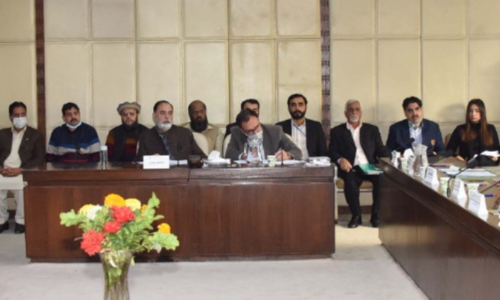ISLAMABAD: With an annual revenue impact of more than Rs350 billion, the Federal Board of Revenue (FBR) is seeking amendments to all the three key tax laws relating to customs, sales tax and income tax, besides the services tax law for the federal capital to meet ‘prior conditions’ of the International Monetary Fund (IMF) and secure about $1bn inflows direly needed for balance of payments support.
According to a summary about revenue measures shared with Adviser to the Prime Minister on Finance and Revenue Shaukat Tarin for an overall briefing to the federal cabinet, FBR chairman Dr Ashfaq Ahmad has explained key features of the Finance (Supplementary) Bill 2021 for “achieving tax reforms with the assistance of development partners with the ultimate objective to be able to generate sufficient revenue for the state”.
The supplementary finance bill, along with other fiscal adjustments, including Rs200bn cut in development budget and about Rs50bn reduction in grants to special security organisations, is likely to come up for approval by the cabinet this week.
Supplementary Finance Bill may be put before cabinet this week
The underlying purpose of the reform exercise as pushed through by the international lenders is to “rebuild the tax system on ideal principles of taxation and without any distortions” as far-reaching structural and administrative reforms had already been initiated by the ‘present government’ to “achieve economic and financial stability through inclusive reforms and sustainable economic growth”.
Officials said the FBR chairman had proposed withdrawal of certain powers of senior customs officers which used to be interpreted by many within the tax machinery as proverbial NRO (National Reconciliation Ordinance) — a term used for giving amnesty to past actions and deeds.
In terms of revenue generation, withdrawal of exemptions and removal of different rates under the sales tax law appear to be the biggest sources of additional tax. There is a long list running in hundreds of items that would attract higher sales tax rates and application of fresh tax.
“Under the Sales Tax Act 1990, zero-rating under the Fifth Schedule is proposed to be streamlined and certain entries are to be withdrawn,” says the summary seen by Dawn. “Exemption regime under Sixth Schedule is proposed to be curtailed including pharmaceutical sector and restricted to import and local supply of essential commodities only,” it states. Moreover, “reduced rates of sales tax under Eighth Schedule on certain items are proposed to be streamlined in order to achieve equity in the tax system”, the FBR chief wrote.
There are hundreds of items in the schedule on which different sales tax rates at one per cent, 2pc, 5pc, 6pc, 7pc, 8pc, 10pc and 12pc are applicable at present instead of standard sales tax rate of 17pc.
“Likewise, sales tax on import of high-end mobile phones in CBU (completely built unit) condition under Ninth Schedule is proposed to be rationalised,” the FBR chairman said, adding that the “scope of Tier-I retailers is also proposed to be rationalised”.
Under the Islamabad Capital Territory (Tax on Services) Ordinance 2001, a few notifications issued from time to time prescribing reduced rates in respect of some services were not consolidated, which is now being done in the schedule to the ordinance.
The summary reports that “minimal amendments in the Income Tax Ordinance, 2001 are aimed at promoting digital economy, documentation and facilitation measures”. Additionally, advance tax on foreign drama serials is proposed to be introduced and slightly enhanced on cellular services.
Disclosure of information in respect of high-level public officials is proposed in the income tax law in line with the requirements of the development partners, rule of law and integrity. Tax relaxations to real estate investment trusts are also being extended to their subsidiary entities called special purpose vehicles.
“Under the Customs Act 1969, the power of collector to determine the value of imported or exported goods is proposed to be withdrawn which shall be exercised by director valuation that has been the case prior to Finance Act 2021,” explained the FBR chief.
Similarly, the appeal against the decision of the director general valuation shall now be filed before judicial fora instead of Member Customs (Policy) in consonance with the principle of separation of judicial and executive functions. “Moreover, in the interest of revenue, corporate guarantee is proposed to be taken out as was the case before September 15, 2021,” he said.
The changes in the Customs Act 1969 followed reports that through the presidential ordinance — Tax Laws (Third Amendment) Ordinance 2021 — on September 15, the tax authorities had broadened the discretion of the customs officials at the risk of massive revenue losses at the import stage. There were demands that these clauses be examined if authors were beneficiaries of the amendments to the customs law.
One such amendment has transferred from the Customs Appellate Tribunal to the Member Customs Policy (FBR) the power to hear appeals against the decisions and judgements of the director general of customs valuation, enabling a customs officer to make, in his capacity as collector, underassessments of duty and taxes on arbitrarily low values and then empowering the same officer to finally uphold such low and arbitrary values in his capacity of appellate authority as member customs.
Published in Dawn, December 13th, 2021
















































